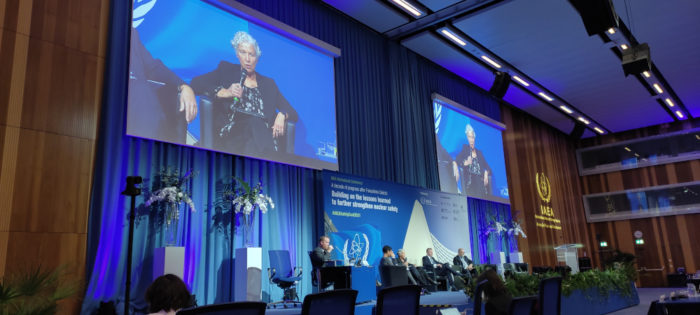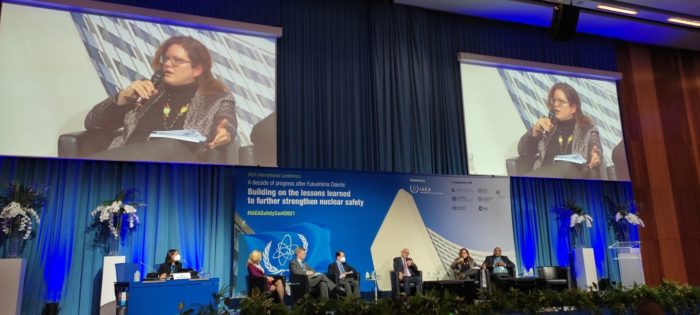IAEA Fukushima Conference Identifies New International Recommendations for Action
The international conference “A Decade of Progress after Fukushima Daiichi” was held in Vienna from 8 to 12 November 2021. Organised by the International Atomic Energy Agency (IAEA), the event dealt with the lessons learned from the nuclear accident in an effort to further strengthen nuclear safety. Primarily, the discussions at the conference resulted in key calls for action. According to the IAEA, these are now to be implemented by the international community.
“A Decade of Progress after Fukushima Daiichi: Building on the Lessons Learned to Further Strengthen Nuclear Safety”, the title of the recent IAEA international conference on Fukushima. Internationally recognised safety experts participating in the conference took stock of the years since the accident occurred at the Fukushima Daiichi Nuclear Power Plant in 2011. “The conference serves as a reminder to us all that a nuclear accident has global consequences. We therefore cannot afford to become negligent in our work. We must work together constantly, including at the international level, to ensure we put a uniformly high safety culture into practice. This should be notable for its continuous improvement of nuclear safety, as set out in the Vienna Declaration,” explains ENSI Director General Marc Kenzelmann following up on the IAEA conference.
The Vienna Declaration
In February 2015, the international community signed the Vienna Declaration on Nuclear Safety at a Diplomatic Conference in Vienna.
The aim of the Declaration is to build new nuclear power plants in such a way as to avoid the need for long-term external emergency preparedness measures in the event of an accident and to ensure that existing nuclear power plants are, wherever possible, brought up to the safety standards demanded of new nuclear installations. This is the only international document to state this safety objective.
By signing the Vienna Declaration, the 77 signatories to the Convention on Nuclear Safety undertook to report back to the respective international review meetings on how the Declaration is being implemented.
The Diplomatic Conference was convened in April 2014 at the Sixth Review Meeting of the Convention on Nuclear Safety following the Swiss proposal to amend the Convention in consideration of the lessons learned from the accident at the Fukushima Daiichi nuclear power plant.
On the one hand, the conference focused on decisions and measures worldwide that have contributed to the improvement of international and national nuclear safety. In this context, for example, it dealt with the response to a possible nuclear emergency and protection of the population from radiation exposure. On the other hand, options for dealing with the current challenges were subject to in-depth consideration, with the conference discussing, for example, how to deal with different communication formats and the importance of transparency.
ENSI’s participation in two panels
ENSI also took part in the conference and was represented on two panels.
Rosa Sardella, Director of the Radiation Protection Division at ENSI, participated in a panel on “Ensuring the Safety of Nuclear Installations”. As part of this panel, she discussed, among other things, measures to ensure the prevention of serious releases of radioactivity, advanced reactor technologies and the importance of the safety culture.

In addition, Annatina Müller-Germanà, head of ENSI’s International Affairs Section, participated in the discussion on improving the effectiveness of international legal instruments in efforts to strengthen nuclear safety worldwide. One of the things she discussed was the question of the extent to which existing legal instruments can achieve internationally targeted objectives. She explained the important role of the Vienna Declaration, which was initiated by Switzerland, in strengthening nuclear safety worldwide and described ways to further increase the effectiveness of international conventions.

Just how ENSI analysed the accident and how the lessons learned were used for the safety of the Swiss nuclear power plants is something ENSI considered in its publication series “Ten Years after Fukushima”.
Calls for action
The IAEA conference gave the international community the opportunity to look at the lessons learned from the Fukushima Daiichi accident from different perspectives. The discussions at the conference resulted in important calls for action – these are recommendations that are now to be implemented by the international community. “Conferences such as the IAEA Fukushima conference must be held on a regular basis in order to discuss important aspects of global nuclear safety and to highlight their political significance,” stated Marc Kenzelmann, summing up the conference.
IAEA’s calls for action implore the international community to promote openness and to incorporate the lessons of Fukushima Daiichi to an even greater extent in its work, and ultimately ensure knowledge transfer for the future, as announced by the IAEA in its press release of 12 November 2021.

